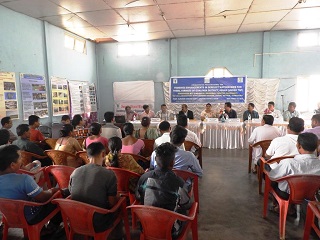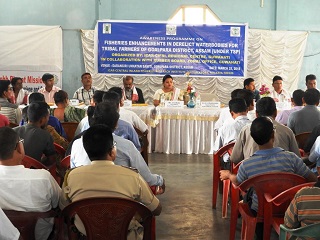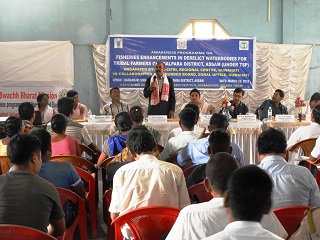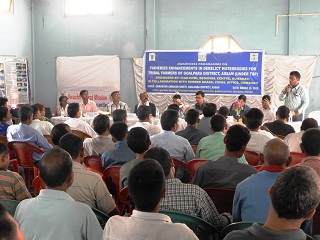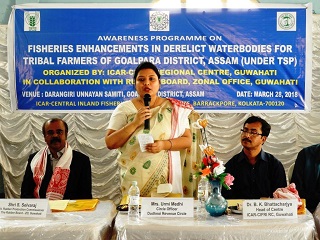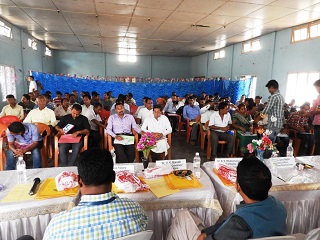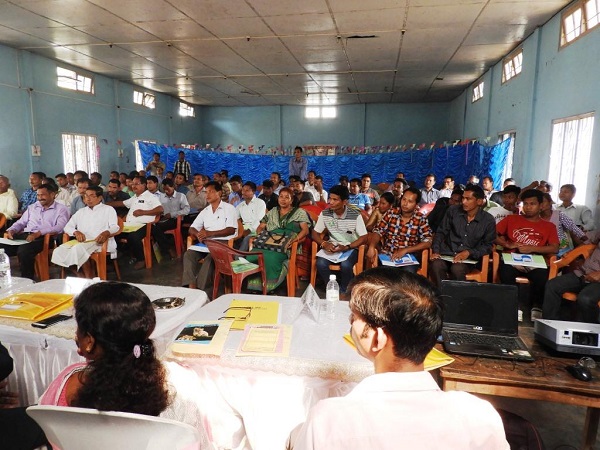Awareness programme on ‘Fisheries enhancements in derelict waterbodies for tribal farmers of Goalpara district, Assam’ under TSP organized on March 28, 2018
An awareness programme on ‘Fisheries enhancements in derelict waterbodies for tribal farmers of Goalpara district, Assam’ was organized by ICAR-Central Inland Fisheries Research Institute, Regional Centre, Guwahati in collaboration with Rubber Board, Zonal Office, Guwahati at Daranggiri, Dudhnoi under TSP programme of ICAR-CIFRI on March 28, 2018. The programme was organized under the overall guidance of Dr. B. K. Das, Director, ICAR-CIFRI, Barrackpore with an objective of enhancing fish production in derelict water bodies lying unutilized within rubber production areas of Goalpara district, Assam.
Dr. B. K. Bhattacharjya, Head of Centre (Acting), ICAR-CIFRI Regional Centre, Guwahati and Convenor of the programme welcomed the Chief Guest Mrs. Urmi Medhi, ACS, Circle Officer, Dudhnoi Revenue Circle, Goalpara (representing Deputy Commissioner, Golapara district); Guest of Honour Dr. U. K. Baruah, Senior Scientist & Head, KVK, Dudhnoi; Shri S. Selvaraj, Joint Rubber Production Commissioner, the Rubber Board Zonal Office, Guwahati, Dr. Bhagaban Kalita, Fishery Development Officer, O/o District Fishery Development Office (DFDO), Goalpara; Shri Debananda Choudhury, President of Rubber Producers’ Society, Goalpara; Mr. Delowar Hussain, Deputy Project Director, CSS-ATMA, Goalpara; Scientists from ICAR-CIFRI; officials from Rubber Board; prospective fish farmers (more than 100 in number) from different areas of Goalpara district, Assam and media personnel.
Dr. B. K. Bhattacharjya briefly explained ICAR-CIFRI’s activities in the region with special emphasis on fisheries enhancement in different open waterbodies of Assam. He requested the farmers to interact with the fisheries experts from the Institute and other resource persons for enhancing their income from fisheries. Shri S. Selvaraj (Rubber Board) urged the rubber producers having small waterbodies with them for judicious utilization of the resources which can improve their income and livelihoods. Dr. U. K. Baruah (KVK, Dudhnoi) explained about the importance of integrated farming system. He stated that the seed of rubber plants can be a source of valuable nutrients in fish feeds and as manure. Mrs. Urmi Medhi lauded the efforts taken by ICAR-CIFRI for creation of awareness among potential and practicing tribal fish farmers of the district. She stated that most of the populace of the district comprised of tribals (Rabha, Bodo and Garo), who are generally socio-economically disadvantaged. She urged the participants to take advantage of the awareness programme organized by the Institute for initiating scientific methods of fish production in unused waterbodies of the district.
The technical session started with a brief presentation from Dr. B. K. Bhattacharjya on different options for fisheries enhancements suitable for different waterbodies of the region. Dr. B. Kalita, explained important aspects of pisciculture including pond preparation, stocking, feeding and water quality management. Dr. Pronob Das explained about the prospects of enclosure culture and stock enhancement in floodplain wetlands of Assam. He also highlighted the importance of fish health management in aquaculture. Dr. D. Debnath, gave a brief presentation on importance of fish feeds and feeding methods in aquaculture.
In the interactive session, participants raised various issues related to conservation of indigenous stocks and beel fisheries resources, of non-availability of quality fish seed and drag nets, and problems of undertaking fish farming in derelict waterbodies, which were answered by the scientists and fishery officers. Smt. Sheeja, Development Officer, Rubber Board Regional Office, Agia proposed the vote of thanks to the administrators, scientists, development officers, rubber growers, news and media for the successful conduct of the awareness programme.
As a follow-up action of the awareness programme, ICAR-CIFRI will provide technical support for enhancement of fish production from the waterbodies located in the rubber plantation areas. The Institute can also consider providing technical and financial support to interested farmer groups for undertaking pen culture in floodplain wetlands (beels) in the locality (as per the mandate of the Institute). The representative from the O/o. the DFDO, Goalpara promised technical help to the fish farmers of the locality as and when required. Deputy Project Director, ATMA, Goalpara has requested the farmer participants to avail capacity building training inside and outside Assam through ATMA. He also requested the practicing farmers to avail financial grants from ATMA (to the tune of Rs. 4000/- per farmer) for critical inputs in aquaculture such as cost of lime, fertilizer and fish seed.
